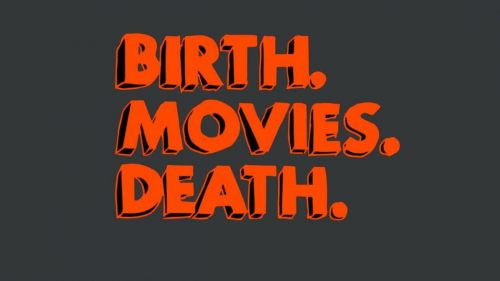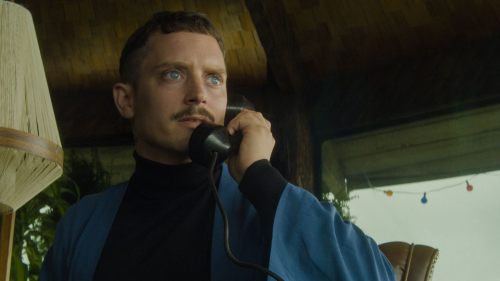Fantastic Fest Review: THE STANDOFF AT SPARROW CREEK Is Right Wing RESERVOIR DOGS
In a recent Wall Street Journal profile, Cinestate producer Dallas Sonnier detailed his plan to make "populist entertainment" in the Age of Trump. A subsection of the movies he bankrolls are aimed at individuals who may have voted for our President and feel alienated by a left-wing Hollywood that uses platforms such as the Oscars to rail against the administration. “If we can make a movie that does not treat them as losers, or ask how dare they vote a certain way, or pander to them, naturally they’re going to respond in a positive way,” said Sonnier, who admits he wrote in a candidate during the '16 election because he both didn't support Hillary Clinton, and was disappointed by Mr. Trump following the Access Hollywood tape revelation.
To be frank, Sonnier's politics are nobody's business but his own (and this right-leaning output is arguably counterbalanced by Cinestate's recent staunchly feminist greenlights). However, this outlined portion of his company’s strategy is admittedly a ballsy one. In an era where "Trump Voter Cinema" comes largely from dismissible madmen such as Dinesh D'Souza, here's a guy freely admitting to crafting well-made motion pictures that could potentially piss off his industry colleagues. Yet this is the foundation of dyed-in-the-wool exploitation moviemaking: he's highlighting a specific element of his art in order to appeal to a niche audience (and hypothetically make a fuckload of money). Enlisting current king of outlaw storytelling S. Craig Zahler - whose movies contain "questionable" politics at best - was a hell of a start, resulting in modern outsider classics Bone Tomahawk and Brawl In Cell Block 99.
Now comes Sonnier's The Standoff At Sparrow Creek, a riveting directorial bow from writer/director Henry Dunham. A (near) single location thriller constructed out of hard men monologuing at one another, Dunham's debut is a taut, tight work of pulp fiction that's practically predestined to draw comparisons to Quentin Tarantino's Reservoir Dogs. By the time the picture reaches its bloody, violent conclusion, we're not really sure whose side we're even on, as nobody is who they seem, and all are ready to tear their paranoid neighbors' throats out.
The plot setup is simple: there's a shooting at a police funeral. Over the CB radio, we get word that a man walked up out of the woods, sporting body armor and toting a modified AR-15, and fired off multiple rounds, killing many boys in blue. Cops say a militia man did it, and the members of a Northern Michigan bunker brigade hunker down in the makeshift war room they've built for themselves in a lumber yard near the titular Creek. Only once they all arrive and start taking inventory, these survivalists realize that one of their weapons - matching the firearm used to perpetrate the crime - is missing. The only people with access to them are all in this room, so it’s up to former police detective Gannon (James Badge Dale) to root out the guilty party, as the tension ratchets up in classic Agatha Christie fashion.
"We always knew this was going to happen," says Hubbel (Gene Jones), before launching into his plan to march down to the 47th Precinct and lay out his perceived enemy. "Go to war with cops? Deep down...who didn't want that?" The greatest triumph of Dunham's film is that he paints every one of Sparrow Creek's players with a distinct shade of paranoia. Ford (Chris Mulkey) is the gruff leader, who just wants this all to end. Beckmann (Patrick Fischler) is the crew’s comms man, trying desperately to apply logic to their predicament. Morris (Happy Anderson) is the former white supremacist, ready to tell anyone who suspects him to go fuck themselves. Noah (Brian Geraghty) is the twitchy blonde boy with a secret to hide. Strangest of all is Keating (Robert Aramayo), a mute who eyes the walls as if they're closing in on them all. In short, they may speak like they’re versed in David Mamet, but we know they all really watch InfoWars.
Dunham stages every scene with exacting precision, blocking his actors in such a fashion that the distance between them can be closed in an instant, either by words or sharp, unexpected actions. Cinematographer Jackson Hunt lets these men hide in deep, near impenetrably black shadows, with sparse light sources bathing the tableaus in gorgeous, RKO-style chiaroscuro. Meanwhile, Editor Josh Ethier takes these stark images and discovers just the right rhythm, giving the individual moments space to breathe, while still letting them flow into one another effortlessly. To wit, The Standoff At Sparrow Creek is a pitch perfect example of low budget craft, a razor sharp 88 minutes that end with a bang that'll keep viewers second guessing everything they just saw.
Nevertheless, it's tough not to wonder if the outsider worldview that Dunham's picture gives a platform to – and definitely fits into the more extreme political category of Sonnier's grand design - is going to give card-carrying liberals a moment of discomforting pause. The ending of The Standoff At Sparrow Creek is an utter doozy, but also one that displays serious distrust of government and its authority. But that's what makes the movie so special: it's unafraid to base its central thesis around an idea that's radical, especially by the current standards of our mainstream entertainment (plus, there’s always going to be that old chestnut of “depiction ≠ endorsement”).
In short, The Standoff At Sparrow Creek might not have been made for you, but that doesn't stop it from being really fucking good.



